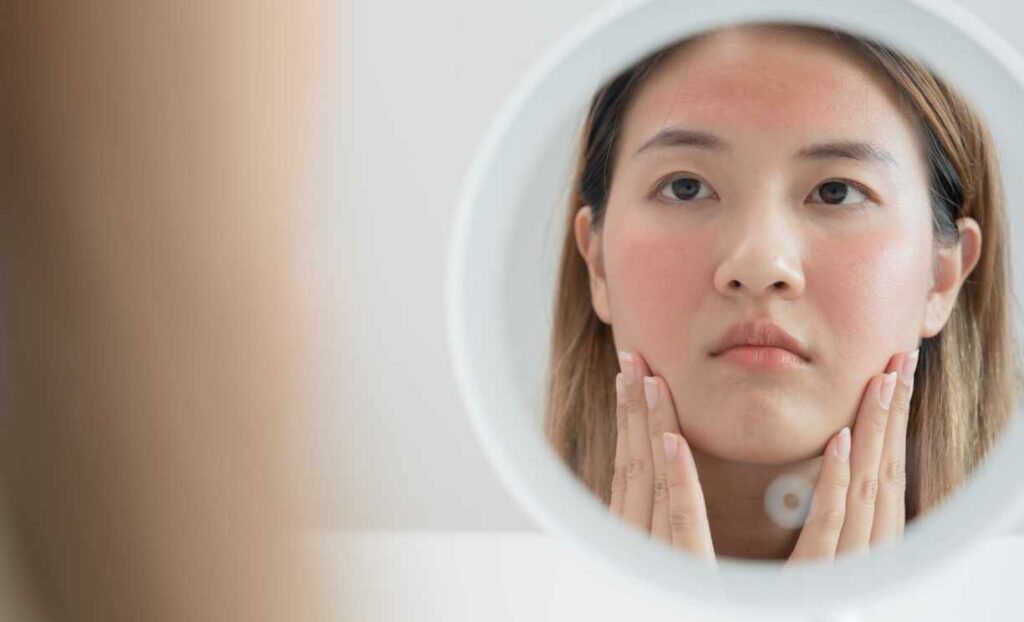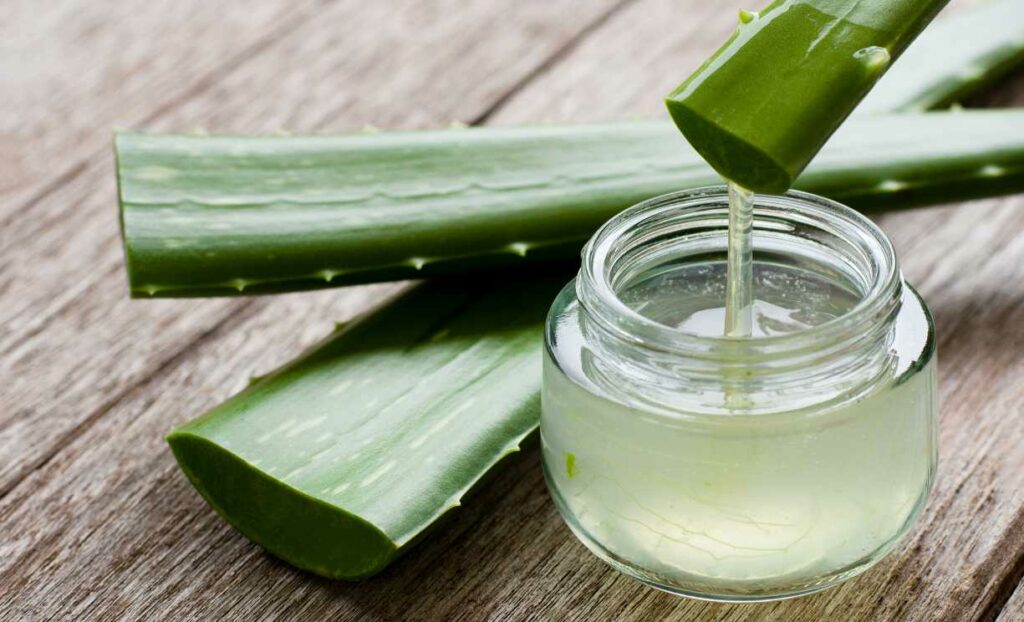Polycystic Ovary Syndrome (PCOS) is a common hormonal disorder that affects individuals in various ways, including its impact on the skin. Hormonal imbalances associated with PCOS can lead to a range of skin issues, from acne to excess facial hair. However, understanding and implementing targeted skincare strategies can significantly improve the complexion and boost confidence for those navigating the challenges of PCOS. In this blog, we’ll explore some common skin problems due to PCOS and the treatment needed for it.
Contents
Skin Problems Associated With PCOS
Polycystic Ovary Syndrome (PCOS) is a complex hormonal disorder that can manifest in various ways. Individuals with PCOS often experience skin problems that can affect their well-being. Understanding these skin-related challenges is crucial for effective management. Here are some common skin problems associated with PCOS:
- Acne: Hormonal imbalances in PCOS can stimulate the sebaceous glands to produce excess oil, leading to acne breakouts. This is particularly common in the chin, jawline, and lower face areas.
- Hirsutism (Excessive Hair Growth): Elevated levels of androgens (male hormones) in PCOS can result in hirsutism, leading to the growth of excess facial and body hair. This can be emotionally distressing for individuals.
- Skin Tags: PCOS is associated with insulin resistance, and this can contribute to the development of skin tags—small, benign growths that often appear in areas with friction, such as the neck and underarms.
- Hyperpigmentation: Darkened areas of the skin, known as hyperpigmentation, can occur in individuals with PCOS. This can be attributed to insulin resistance and hormonal fluctuations.
- Acanthosis Nigricans: This is a condition characterized by dark, velvety patches of skin, typically found in body folds and creases. It is often linked to insulin resistance and may be seen in individuals with PCOS.
- Oily Skin: Excess androgen production can lead to an increase in sebum (oil) production, resulting in oily skin. This can contribute to the development of acne.
- Scalp Hair Thinning: While excess hair growth (hirsutism) is a common symptom, some individuals with PCOS may also experience thinning of hair on the scalp.
- Cystic Lesions: Severe cases of acne in PCOS may lead to the formation of painful cystic lesions beneath the skin’s surface, requiring specialized treatment.
- Dry Skin: While excess oil production is common, hormonal imbalances can also lead to dry and flaky skin in some individuals with PCOS.
Why Does PCOS Cause Skin Problems?
PCOS, or Polycystic Ovary Syndrome, causes skin problems primarily due to hormonal imbalances. Women with PCOS often experience elevated levels of androgens, which are male hormones present in both men and women. These elevated androgens can lead to an overproduction of oil by the skin’s sebaceous glands, resulting in oily skin and an increased likelihood of acne breakouts. Additionally, insulin resistance, a common feature of PCOS, can contribute to skin issues.
Insulin resistance prompts the body to produce more insulin, which, in turn, may stimulate the release of androgens. This hormonal interplay can lead to conditions like hirsutism (excessive hair growth), skin tags, and darkened areas of the skin known as hyperpigmentation. The complex hormonal changes in PCOS influence various aspects of skin health, making individuals more susceptible to a range of dermatological challenges.
Treatment For Skin Problems Due To PCOS
The treatment for skin problems associated with PCOS involves a multifaceted approach addressing hormonal imbalances, managing specific skin concerns, and adopting a comprehensive skincare routine. Here are common strategies for treating skin problems due to PCOS:
- Hormonal Management: The treatment for skin problems linked to PCOS often involves hormonal management. Birth control pills are commonly prescribed to regulate hormonal fluctuations, reduce elevated androgen levels, and alleviate issues such as acne and hirsutism. Additionally, anti-androgen medications like spironolactone may also help counter the effects of androgens.
- Topical Treatments for Acne: Addressing acne associated with PCOS often includes the use of topical treatments. Retinoids and benzoyl peroxide are effective in promoting skin cell turnover and reducing bacterial growth, helping manage acne lesions. Your doctor may also recommend prescription-strength antibiotics.
- Hair Removal Techniques: Excess facial and body hair, is a common concern in PCOS. Laser hair removal offers a long-term solution, while prescription creams such as eflornithine can slow down facial hair growth, providing relief and improving self-esteem.
- Skincare Routine: A tailored skincare routine is crucial for managing skin problems in PCOS. Gentle cleansing using a mild, non-comedogenic cleanser helps remove impurities without over-drying the skin. Moisturizing, even for oily skin, is essential to maintain skin health, and sun protection with a broad-spectrum sunscreen is vital to prevent UV damage.
- Professional Dermatological Guidance: Seeking professional guidance from dermatologists is essential for addressing specific skin concerns. Dermatologists may recommend procedures such as chemical peels to exfoliate the skin and improve texture, or microdermabrasion to reduce acne scars and enhance skin tone.
- Consultation with Healthcare Providers: Regular check-ups with healthcare providers, including gynecologists and dermatologists, ensure ongoing monitoring of skin health. This allows for adjustments to the treatment plan as needed, optimizing the approach to individual concerns and providing comprehensive care.
Home Remedies To Manage Skin Care Problems Due To PCOS
While professional medical guidance is essential for managing skin problems associated with PCOS, several home remedies can complement your skincare routine. These remedies focus on promoting overall skin health and reducing specific concerns. Here are some home remedies to consider:
- Tea Tree Oil for Acne: Tea tree oil has antimicrobial properties and may be beneficial for managing acne. Dilute tea tree oil with a carrier oil and apply it to acne-prone areas. Perform a patch test first to ensure no adverse reactions.
- Aloe Vera Gel: Aloe vera has soothing and anti-inflammatory properties. Applying pure aloe vera gel to affected areas may help reduce inflammation and redness associated with acne.
- Turmeric Paste: Turmeric has anti-inflammatory and antioxidant properties. Create a paste by mixing turmeric powder with water or yogurt and apply it to areas with hyperpigmentation. Leave it on for a short period and rinse off.
- Green Tea Compress: Green tea contains antioxidants that may benefit the skin. Brew green tea, let it cool, and use it as a compress on areas with acne. The tannins in green tea may help reduce inflammation.
- Exfoliation with Oatmeal: Oatmeal can be used as a gentle exfoliant. Mix ground oatmeal with water to create a paste and use it as a scrub. This helps remove dead skin cells without causing irritation.
- Yogurt Mask: Yogurt contains lactic acid, which has exfoliating properties. Applying plain yogurt as a mask may help improve skin texture. Rinse off gently after leaving it on for a short duration.
Lifestyle Changes For Managing PCOS Skin Problems
Making certain lifestyle changes can significantly contribute to managing skin problems associated with PCOS. These changes aim to address hormonal imbalances, promote overall well-being, and enhance the effectiveness of skincare routines. Here are lifestyle modifications to consider:
- Balanced Diet: Adopting a balanced and nutrient-dense diet is crucial for managing PCOS. Focus on whole foods, including fruits, vegetables, whole grains, and lean proteins. Limit processed foods and added sugars, as they can contribute to insulin resistance.
- Regular Exercise: Engage in regular physical activity, as exercise has been shown to improve insulin sensitivity and regulate hormone levels. Aim for a combination of aerobic exercises and strength training for holistic health benefits.
- Maintain a Healthy Weight: Maintaining a healthy weight is essential for managing PCOS symptoms, including skin issues. Weight management can positively impact insulin sensitivity and hormonal balance.
- Adequate Sleep: Prioritize getting enough quality sleep. Lack of sleep can contribute to stress and hormonal imbalances, affecting skin health. Aim for 7-9 hours of sleep per night.
- Stress Management: Practice stress-reducing techniques such as meditation, deep breathing exercises, or yoga. Chronic stress can exacerbate hormonal imbalances, contributing to skin problems.
- Limit Caffeine and Alcohol: Excessive caffeine and alcohol intake can disrupt hormonal balance and contribute to skin issues. Limiting the consumption of these substances can be beneficial.
- Stay Hydrated: Drinking an adequate amount of water is crucial for overall health, including skin hydration. Proper hydration supports skin elasticity and can help reduce the appearance of dryness.
- Avoid Smoking: Smoking can have detrimental effects on skin health and exacerbate hormonal imbalances. Quitting smoking can positively impact overall well-being.
- Choose Skincare Products Wisely: Opt for skincare products that are non-comedogenic and suitable for your skin type. Avoid products with harsh chemicals that may irritate the skin.
Conclusion
In conclusion, treatment for skin problems associated with Polycystic Ovary Syndrome (PCOS) requires a multifaceted approach that combines medical treatments, skincare routines, and lifestyle changes. The hormonal imbalances characteristic of PCOS can contribute to various skin issues, including acne, hirsutism, and hyperpigmentation. Seeking professional medical guidance is crucial for an accurate diagnosis and the formulation of an effective treatment plan.
By combining medical expertise, effective skincare practices, and lifestyle adjustments, individuals with PCOS can take proactive steps toward achieving healthier skin and overall well-being. Remember, consistency and patience are vital on this journey, and consulting with healthcare professionals ensures the best possible outcomes in the management of PCOS-related skin concerns.





